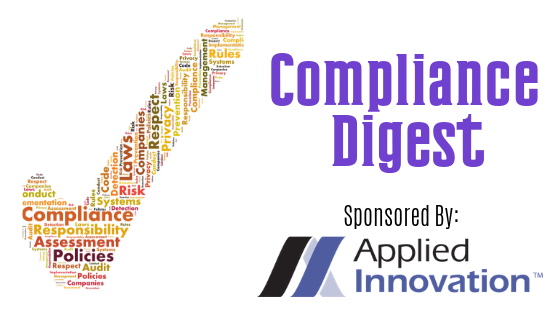Every week, AccountsRecovery.net brings you the most important news in the industry. But, with compliance-related articles, context is king. That’s why the brightest and most knowledgable compliance experts are sought to offer their perspectives and insights into the most important news of the day. Read on to hear what the experts have to say this week.
I’m thrilled to announce that Applied Innovation has signed on to be the new sponsor of the ARM Compliance Digest. Utilizing over 50 years’ experience in the collections industry and over 75 in technology, Applied Innovation is helping to shape the future of accounts receivable management.
House, Senate Leaders Announce Deal on Compromise Anti-Robocall Bill
A bipartisan group of leaders from the House and Senate announced on Friday that they had joined together and worked out a compromise anti-robocall bill, which will be called the Pallone-Thune TRACED Act. More details here.

WHAT THIS MEANS, FROM JOANN NEEDLEMAN OF CLARK HILL: While it is refreshing to see this do-nothing Congress actually do something, and do it in a bi-partisan fashion, industry has to be concerned that the one issue that seems to align both political parties is robocalls. Couple that with the fact that the Federal Communications Commission (FCC) simply has been unable to provide any guidance or do anything significant to with regard to illegal robocalls and rulemaking around the Telephone Consumer Protection Act (TCPA) suggests that this legislation is nothing but a Band-Aid. Sadly, legitimate callers become the proverbial babies that get thrown out with the bath water.
While we do not know what the compromise bill looks like, the highlights of both bills provide insight:
- The TRACED Act expands the statute of limitations for violations, broadens the authority of the FCC to levy civil penalties and forfeitures of up to $10,000 per call, mandates a taskforce of federal regulators and states attorneys general to report to Congress on improving deterrence and criminal prosecution, requires carriers to develop call authentication technologies (STIR/SHAKEN) and mandates that the FCC initiate rulemaking to protect consumers from receiving unwanted calls and texts.
- The Stopping Bad Robocalls Act has many similar provisions, although as it relates to rulemaking, it requires the FCC to ensure that new rules address the withdraw of consent to be called and that callers maintain sufficient records to support consent. Further the bill requires the FCC to implement consumer protections on exempted classes of robocalls with limits on the amount of calls.
While both bills expand the FCC’s enforcement authority, many in the industry know that the truly bad players are sophisticated actors who operated oversees. How these bills will empower the FCC to stop these actors still remains a mystery. Furthermore, a published report by the Wall Street Journal found that while the FCC has issued $208 million dollars in fines against robocallers since 2015, they have only collected $6,790. Clearly enforcement is not the answer.
Sadly, neither of these bills address the issue of what is the proper technology callers can use to make legitimate and necessary calls to a consumers. Here, the FCC has failed by not issuing rules to define an Automatic Telephone Dialing System (ATDS). Having this definition would go a long way in determining the good and bad apples. The FCC’s inaction may also result in the Supreme Court weighing in on the ATDS definition. This week, several industry group and entities filed amicus briefs in support of Facebook’s writ of certiorari with the United States Supreme Court.
As Congress looks to resolve the robocall issue, it would be wise to consider the perspective of the legitimate players in the industry who not only communicate with consumers everyday but have the relevant understanding of how consumers want to be contacted. Treating all callers the same, without considering an industry that has invested heavily in compliance, will in the end harm consumers.
THE COMPLIANCE DIGEST IS SPONSORED BY:
Judge Denies MTD in Case Over Where Garnishment Action Was Filed
A District Court judge in Oregon has denied a defendant’s motion to dismiss after it was sued for allegedly violating the Fair Debt Collection Practices Act over whether filing a garnishment notice is a legal action against a consumer or the consumer’s employer. More details here.

WHAT THIS MEANS, FROM DENNIS BARTON OF THE BARTON LAW GROUP: WARNING: The statement you are about to read is alarming. You should only read this after being seated and having taken a very deep breath. Exhale slowly. Are you ready? The court’s decision in Simpson v. Newman, Hesse & Associates is wrong. A judge incorrectly interpreted the law and reached the wrong conclusion. I know that is shocking to read, so I will give you a moment before we proceed.
In Simpson, a judgment-debt was garnished by an employer located in a different jurisdiction and filed a claim alleging a violation of the FDCPA’s venue provision in § 1692i. It states a legal action can only be brought against any consumer in the county in which the consumer resides, the underlying contract was signed, or in actions to enforce rights related to real property, where that land is located.
The First, Seventh, and Eighth Circuits are the only three federal judicial circuits that have ruled on whether the venue restriction of § 1692i applies to the garnishment of wages. All three said no (and trust me on this – my collection firm was the named-defendant prevailing on this argument in the Eighth Circuit: yes, your welcome). Unfortunately, the court in Simpson incorrectly believed the Ninth Circuit’s Fox v. Citicorp Credit Servs., Inc. is a fourth case on this issue (Oregon is located in the Ninth Circuit). Fox only stated an action to enforce a judgment is a legal attempt to collect a debt, but the Ninth Circuit did not address nor hold a garnishment is an action “against any consumer.”
While I understand an Oregon district court like the Simpson court must follow the precedent established by Fox, the Simpson court did not understand that precedent. Yes, Fox said a garnishment is a legal action, but it is not an action against the judgment-debtor, and Fox did not say it was. For those outside the Ninth Circuit, there is a small probability of exposure for filing a garnishment against an employer in a county (or even state) different than the judgment-debtor (as we all know, nothing is 100% safe).
In the Ninth Circuit, however, you must make a business decision weighing garnishment revenue from employers located in a county other than the consumer’s county against the likelihood of a lawsuit (which could be a class action). While I believe the law is on your side (THIS IS NOT LEGAL ADVICE), this reminds us collectors must make practical decisions. One recommendation for those in the Ninth Circuit who are willing to garnish outside the consumer’s county, is to conduct a litigious-debtors scrub (like the one WebRecon offers) prior to filing a garnishment. You may also notice consumers in some counties are more litigious than in other counties and instruct you collector attorneys to avoid the practice in those counties.
House Committee Passes Eight Bills, Five Related to Debt Collection
The House Financial Services Committee on Thursday passed eight bills, including five that relate to debt collection or the Fair Debt Collection Practices Act. More details here.

WHAT THIS MEANS, FROM PORTER HEATH MORGAN OF MALONE FROST MARTIN: These bills provide insight as to what critics of our industry and consumer advocates feel are abusive or unfair practices, but are unlikely to make an impact on the industry anytime soon, if at all. All of these bills passed their respective House committees and will now go to the full House for a vote, which already has a backlog of bills that are waiting to be called to a vote. And even if they are called up for a vote and passed, they would still need the Senate to approve the bills as well.
Many of these bills target low hanging fruit of abusive and unfair practices and perceived “loopholes” in the FDCPA, such as its applicability to federal agencies debt, municipal debt, debt buyers, and even small businesses.
One bill focuses collection practices against active service members which received bi-partisan committee support and appears it would have the highest likelihood of passing the House.
The most interesting bill seeks to prohibit consumer contact by email or text without consumer consent, and seeks to prohibit the CFPB from issuing any rules allowing collectors to send unlimited emails or text messages. Of course, the CFPB has no current proposed rules to allow for unlimited email or text messages, but these concerns seem to come directly from consumer advocate comments to the CFPB’s NPRM.
Judge Grants MSJ For Defendant in FDCPA Case Over Creditor Name Reported to Credit Bureau
A District Court judge in Florida has granted a defendant’s motion for summary judgment after it was sued for violating the Fair Debt Collection Practices Act because it referenced the name of a creditor that purchased the original creditor in a collection letter. More details here.

WHAT THIS MEANS, FROM JUNE COLEMAN OF CARLSON & MESSER: This case exemplifies the trends we have seen in the industry that more cases are being filed regarding credit reporting. When the economy is good, people use their credit more and look at their credit reports more. We see more cases arising from credit reporting, and there is the possibility that actual damages are greater in credit reporting cases – when there are actual damages. The rejection of credit could mean damages because of higher interest or lost opportunities to buy that house or that car. We have seen an increase in FCRA claims by almost 9% over last year, and in the last five years, FCRA claims have doubled. But that doesn’t tell the complete story because that statistic only captures FCRA claims – this case and other recent cases, explore how to make a case about credit reporting an FDCPA case. But we have also seen a growing reluctance by courts, especially federal courts, reject cases with claims of minor, technical issues, whether based on a lack of standing or other arguments.
In recent years, we have seen FDCPA cases based on credit information reported to credit reporting agencies, other than the typical cases of whether the balance is correctly reported and whether the furnisher has reported the disputed nature of the debt. These cases involve wrong codes reported to the credit reporting agencies, information that is slightly off. This is such a case – whether the furnisher, a collection agency, reported the correct name of the original creditor. In this case, the debt, an unpaid cable/internet account, was admittedly in default in or about August 2015 and owed to Bright House. Charter acquired Bright House in May 2016, and perhaps the most important fact is that Bright House continues to exist as a subsidiary of Charter. Charter referred the debt to a collection agency years later, who ultimately reported the debt to a credit reporting agency. The collection agency reported to the credit reporting agency that the “original” creditor was Charter. Plaintiff filed suit, alleging that the collection agency had incorrectly identified the “original” creditor.
We have seen cases where the failure to correctly identify the original creditor in a letter or a lawsuit has led to liability. (See, e.g., Tourgeman v. Collins Fin. Servs., Inc., 755 F.3d 1109, 1122-23 (9th Cir. 2014), as amended on denial of reh’g and reh’g en banc (Oct. 31, 2014).) In those cases involving letters and lawsuits, the Court stressed that the identification of the wrong original creditor would be confusing to the least sophisticated debtor, who would not recognize the wrong company and the consumer’s attempts to contact the wrong company would likely be futile. And thus, such inaccuracies are deemed material. The plaintiff also pointed to the Metro 2 Guidelines, which stated that the original creditor field should contain the name of the company that originally opened the account. However, in the credit reporting context, the collection agency noted that there is only one field for “creditor” information in the Metro 2 format accepted by credit reporting agencies. Thus, because Bright House was acquired by Charter – and therefore Charter was in fact the current name of the company that opened plaintiff’s account, the current creditor was accurately identified. Indeed, the collection agency had in fact written to the plaintiff noting that Bright House is now Charter.
Many courts have held that violation of the Metro 2 Guidelines is not a violation of the FDCPA. (See, e.g., Meeks v. Equifax Info. Servs., LLC, 2019 U.S. Dist. LEXIS 71774, *9 n.3 (N.D. Ga. March 4, 2019); Dash v. Midland Funding LLC, Case No. 8:16-cv-2128-T-36AAS, 2017 WL 841116, *2 (M.D. Fla. Mar. 3, 2017); Lee v. Sec. Check, LLC, Case No. 3:09-CV-421-J-12TEM, 2010 WL 3075673, *8 (M.D. Fla. Aug. 5, 2010); Acosta v. Campbell, Case No. 6:04-cv-761-Orl-28DAB, 2006 WL 146208, *13 (M.D. Fla. Jan. 18, 2006).) The Metro 2 Guidelines came into existence as part of a multi-state settlement agreement between various states and the credit reporting agencies, designed to improve accuracy in credit reports. The Koehler Court characterized the identification of the creditor in the credit report as a potential failure to follow the Metro 2 Guidelines and granted summary judgment for the collection agency. While the Court provided no analysis, relying on the Florida cases cited above, the collection agency advanced several arguments that might have swayed the Court to follow this line of cases. For instance, the accuracy of credit reporting falls under the purview of the FCRA, and the FCRA provides very limited liability to a furnisher of information. Collection agencies who furnish information are caught in a difficult position, since they act as a mere conduit of information from the creditor to the credit reporting agencies. The narrow scope of liability under the FCRA appears to recognize this issue. Thus, furnishers should not be held to more expansive liability under other statutes, like the FDCPA. Additionally, the FDCPA focuses on identifying the current creditor, through section 1692g. Therefore, the purposes of the FDCPA that drive the requirement to disclose the current creditor are served when the collection agency identifies the current creditor to the credit reporting agencies. One might even argue that the material information in a credit report is who is reporting the debt, and that whether the “original” creditor contains the former name of the company or the current name of the same company is immaterial. Finally, this case may have turned out differently if the situation involved a debt purchaser.
This case was appealed on Nov. 5, so the Eleventh Circuit will have the opportunity to chime in on this issue.
FTC Goes After Student Loan Debt Relief Scam That Alleged to Take Over Servicing
The Federal Trade Commission is continuing its assault on student loan debt relief scams, obtaining a temporary restraining order against an operation that is alleged to have pocketed $43 million in revenue from individuals, largely via illegal upfront fees. More details here.

WHAT THIS MEANS, FROM VIRGINIA BELL FLYNN OF TROUTMAN SANDERS: The Federal Trade Commission (FTC) has blocked the operations of a group of companies allegedly portraying themselves as being affiliated with the U.S. Department of Education (DOE), charging that they promoted student loan debt-relief services but did not follow through as promised.
According to the FTC lawsuit, Arete Financial Group and related companies allegedly offered to reduce and even wipe out borrowers’ student loan debt—but instead collected fees and then did nothing to help the borrowers. The FTC alleges that after collecting an illegal upfront fee, Arete would contact borrowers’ current loan servicer and place the loans into temporary forbearance or deferment status – often without borrowers’ permission or knowledge. Meanwhile, borrowers were sending in monthly payments that Arete was supposedly putting towards the borrowers’ loans – but the FTC is alleging the money really just went into Arete’s pockets.
How did Arete get away with this? According to the FTC’s website and the allegations in the complaint, borrowers thought Arete was legitimate– namely because they claimed to work directly with loan servicers and the DOE. But Arete operated by changing borrowers’ Federal Student Aid (FSA) login ID, password, and contact information with their loan servicer. This cut off contact between borrowers and their loan servicers, so borrowers allegedly wouldn’t find out the truth until it was too late.
The FTC alleges that Arete’s alleged lies led to very real harm to borrowers. Some people’s loans are now delinquent, and their income tax refunds are being garnished. All of the monthly payments to Arete that never actually went towards borrowers’ loans is believed to have gone missing.
The companies allegedly charged borrowers $500 to $1,800 each in up-front fees, as well as monthly fees between $19 and $49. They allegedly collected at least $43 million in revenue since beginning the operation, the FTC’s complaint said.
From a compliance perspective, it is important to remember that the FTC has had made hay with a fair amount of student loan servicers and other companies it views as “predatory.” Where services are being offered that could be considered more high risk or where the population is a riskier population, make sure your P&P are clear and simple and outward facing messaging matches the same
FCC Seeking Comment on Whether Follow-Up Texts Run Afoul of TCPA
The Federal Communications Commission is seeking public input into a request for a Declaratory Order that would allow companies to send a follow-up text message to an individual who had opted out of receiving messages to clarify whether the individual is seeking to opt out of receiving specific requests or whether the individuals wants to stop receiving text messages from the sender altogether. More details here.

WHAT THIS MEANS, FROM NICOLE STRICKLER OF MESSER STRICKLER: Capital One’s request for clarification highlights why “one size fits all” doesn’t always work in the real world where some messages are more important than others. While some texts may be designed to market products or services, others may be designed to specifically prevent consumer harm, such as the avoidance of a late payment or deal with a fraud alert. Capital One’s text technology, unlike that of the past, allows its system to send multiple different types of informational texts to a consumer. As a result, Capital One requests the ability to respond to a consumer’s opt out request to clarify whether the request is as to all messages or just a certain type of messages. As businesses continue to integrate evolving technology into their businesses, we can anticipate this will be one of many future requests for clarification on the TCPA.
NCLC Publishes Report, Creates Model Language To Update State Exemption Laws
The National Consumer Law Center has issued a report looking at state exemption laws related to how much can be protected from garnishment and developed a model bill for states to use that would increase consumer protections in this area. More details here.

WHAT THIS MEANS, FROM MITCH WILLIAMSON OF BARRON & NEWBURGER: The National Consumer Law Center recently published “No Fresh Start in 2019: How States Still Allow Debt Collectors to Push Families into Poverty” which is a detailed study of garnishment and exemption laws in the United States. This study provides much of the data relied on for the previously published “Model Family Financial Protection Act” (revised in May 2019). Both documents make for interesting reading. They provide a window in the mind of those who both represent debtors and advocate against our industry. These are not the people constantly looking for new angles to sue debt collectors, rather these are the true believers who are behind the CFPB and the push for new laws to “protect” consumers from the wolf at the door. The following quote is illustrative of their philosophical position:
Protection of wages is one of the most important roles of exemption laws. When creditors garnish a consumer’s wages, the employer is required to take the money from the consumer’s paycheck and send it to the creditor. The consumer never sees that money and cannot use it to pay higher-priority obligations such as rent, food, and child care. Instead, the money goes to pay old credit card debts, written-off medical bills, or the amount still owed after a car was repossessed and sold.
No Fresh Start, November 2019 at page 12.Ok you already know they hate us – So why should you care? Because this is their playbook in a condensed version. It has a few of the horror stories we are all familiar with for flavor – entire bank account of an 82-year-old pensioner seized/restrained causing bounced checks and other calamities. It doesn’t differentiate where the debtor was irresponsible and failed to respond to prior notices or the collectors fault for failing to investigate the account. (By way of example I’ve seen one two many cases where judgments were transferred from one collector to another and it is discovered, after a lawsuit has been filed against the collector, that the judgment had previously been vacated or satisfied. The account in question had not been updated by the owner of the account at the time and the receiving company did not perform an independent investigation before starting its collection activities.)
Know they enemy. A better understanding of the arguments raised by the consumer bar, can only help collection efforts. It will allow you to take the issues into account when planning your collection strategies. Another point is that some of the information contained in the state by state analysis is misleading or just wrong. Additionally the report has a heavy concern regarding the seizure of personal property. If any of you out there are trying to get pots and pans, sewing machines etc – stop it. Stick to the big ticket items $4000 TVs and Mercedes. Preparing well thought out responses to the issues raised in this study in advance can only help when dealing with the Courts. It will also save on defense litigation costs. The most expensive consumer lawsuits are usually those which could have been avoided by better review processes. To be clear, this is not about compliance, this is about collection strategies.
Judge Lowers Attorney Fee Award in FDCPA Case by 27%
A District Court judge in Connecticut has reduced the amount to be awarded in attorney’s fees by 27% to a plaintiff who won a Fair Debt Collection Practices Act lawsuit against a collection law firm that listed two different amounts owed in a collection letter that was found to be materially misleading. More details here.

WHAT THIS MEANS, FROM MATT KIEFER OF THE PREFERRED GROUP OF TAMPA: In Garcia v. Law offices of Howard Lee Schiff, P.C., the Judge of the United States District Court in the District of Connecticut, Judge Victor A. Bolden, lowered the plaintiff’s attorney fees by 27% after plaintiff won the case for an FDCPA violation. One of the attorneys, Yaakov Saks, is a very familiar name to agency owners and operators. He was seeking an hourly rate of $400 for himself, $350/hr for attorney Rachel Drake and $350 for attorney Raphael Deutsche. Was that “reasonable”? The defendant contested the amounts and the Judge agreed, somewhat, citing that another plaintiff counsel with 45 years of experience was awarded a $400 hourly rate in a case in 2016 and is recognized nationally in her practice, but Saks only has nine years of experience.
“Any debt collector found in violation of the Fair Debt Collection Practices Act is also liable for “the costs of the action, together with a reasonable attorney’s fee as determined by the court.” 15 U.S.C.A. § 1692k(a)(3). To determine attorney’s fees, “a district court should consider the rate [a] reasonable, paying client would pay, and use that rate to calculate the presumptively reasonable fee.” Arbor Hill Concerned Citizens Neighborhood Ass’n v. Cty. of Albany & Albany Cty. Bd. of Elections, 522 F.3d 182, 193 (2d Cir. 2008).” (Court Filing-Ruling And Order On Plaintiff’s Motion for Attorney’s Fees and Costs)
But the court also takes into consideration other factors like the complexity and difficulty of the case, available expertise, capacity of the client’s other counsel, the resources required to prosecute, whether the attorney might have expected low to no remuneration (like taking or initiating the case pro bono, etc.), and the prevailing market rates charged in the district where the case was brought.
Pretrial litigation went on for three years and Saks stated he had 152.4 hours invested and Drake and Deutsche had 16.1 and 2.7 hours respectively. The Judge awarded Saks a $300 rate and Drake and Deutsche a $200 rate. So the total for attorney fees and costs ended up being $50,085—for a single violation. In this case it was two different balances in a letter “that confused the consumer”. Back in August, the court awarded $500 in damages under the FDCPA and said the Schiff firm was not entitled to the bona fide error defense to strict liability under the statute. But that is a $1,000 less than the Schiff firm offered back in the beginning of the litigation in 2016 with a Rule 68 Offer of Judgment. Had the offer been $2900 back then (costs and fees incurred up to the Offer of Judgement), the case could have settled and the matter concluded. This was an expensive lesson for the defendant.
Thanks again to Applied Innovation — the team behind ClientAccessWeb, Papyrus, PayStream, and GreenLight — for sponsoring the Compliance Digest.










